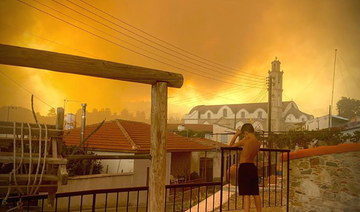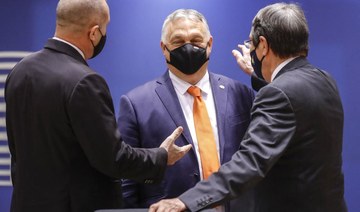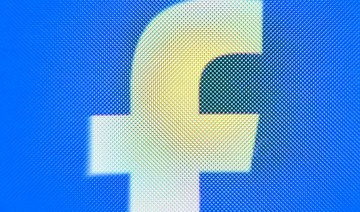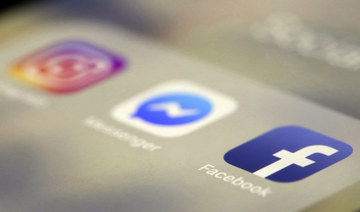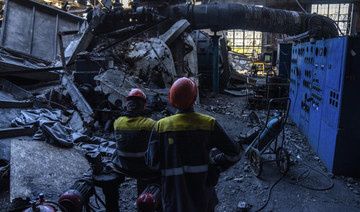NICOSIA: A deadly brush fire that claimed four lives and has been described as the most destructive blaze in Cyprus’ 61-year history as an independent republic is now fully under control, Cypriot authorities said Monday.
Cyprus’ Forestry Department said more than 600 people managed to contain the blaze early Monday after it scorched more than 55 square kilometers (21 square miles), forcing the evacuation of nine villages and burning down homes, businesses, orchards and forest.
Fire crews remain on the scene in case the blaze reignites amid temperatures reaching 35 C (95 F). Cyprus Electricity Authority officials said they hope to have power restored to at least seven villages by Monday evening.
Search crews on Sunday discovered the bodies of four people who are believed to be Egyptian laborers outside the village of Orou on the southern edge of Cyprus’ main Troodos mountain range.
The men, ages 22 to 29, had gone missing Saturday afternoon when the fire began outside the nearby village of Arakapas and spread quickly amid strong winds.
Officials said the four tried to flee the fire along a dirt mountain track, but their small truck veered off the road and fell down an embankment. They tried to flee on foot, but didn’t make it.
Trade Union PEO has asked for a full investigation into the laborers’ deaths as well as their work safety conditions.
President Nicos Anastasiades called the fire “an unprecedented tragedy” for Cyprus except for the destruction wreaked by a 1974 war that split the island along ethnic lines after Turkey invaded in response to a coup aimed at union with Greece.
Some residents who lost their homes and property to the fire wept as they described seeing a lifetime’s worth of labor going up in flames. People were allowed back to their homes after their villages were declared safe.
Anastasiades, who toured the fire-hit villages on Sunday, pledged immediate government help to farmers and homeowners who lost crops and property and the families of those who perished in the fire.
Crews are assessing the damage so that fire-afflicted residents can receive the first compensation packages later this week.
Anastasiades on Monday opened up a bank account for private contributions to help those who lost their homes and livelihoods.
The Cypriot president said to underscore that commitment, he instructed electricity generators to be sent to all villagers who lost power.
He also ordered a renewed tender process for the purchase of a mobile crisis management center, and asked his Cabinet to come up with ideas by Wednesday on how best to support residents financially.
Police spokesman Christos Andreou told The Associated Press that a 67-year-old man is being investigated on arson charges. He said “more than one witness” had seen the man leave his orchard shortly before a fire broke out there. A court ordered that he remain in custody for eight days.
Fire crews had been joined by police officers, soldiers, Civil Defense and Wildlife Service staff as well as many members of the public who volunteered to help. Authorities said more than 70 fire engines, 14 bulldozers and numerous water tankers were mobilized, while a National Guard drone provided eyes overhead to locate new fire fronts.
A total of nine Cypriot firefighting aircraft, and police and National Guard helicopters were deployed. Two helicopters from British military bases in Cyprus also helped firefighting efforts, along with two Greek Canadair CL-415 aircraft and two Israeli fixed-wing planes.
Anastasiades spoke separately with the prime ministers of Greece and Israel to thank them for their help.
Cyprus forest fire that killed 4 now under control
https://arab.news/564t2
Cyprus forest fire that killed 4 now under control
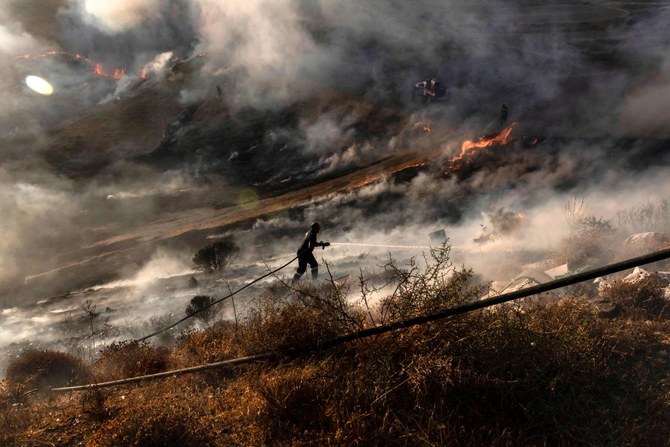
- Cyprus’ Forestry Department said more than 600 people managed to contain the blaze early Monday
- President Nicos Anastasiades called the fire “an unprecedented tragedy” for Cyprus
Israel attacks Rafah after Hamas claims responsibility for deadly rocket attack

- Israel has killed more than 34,600 Palestinians, according to Gaza’s Health Ministry
CAIRO: Three Israeli soldiers were killed in a rocket attack claimed by Hamas armed wing, near the southern Gaza Strip city of Rafah, where Palestinian health officials said at least 19 people were killed by Israeli fire on Sunday.
Hamas’s armed wing claimed responsibility on Sunday for an attack on the Kerem Shalom crossing into Gaza that Israel said killed three of its soldiers.
Israel’s military said 10 projectiles were launched from Rafah in southern Gaza toward the area of the crossing, which it said was now closed to aid trucks going into the coastal enclave. Other crossings remained open.
Hamas’ armed wing said it fired rockets at an Israeli army base by the crossing, but did not confirm where it fired them from. Hamas media quoted a source close to the group as saying the commercial crossing was not the target.
More than a million Palestinians are sheltering in Rafah, near the border with Egypt.
Shortly after the Hamas attack, an Israeli airstrike hit a house in Rafah killing three people and wounding several others, Palestinian medics said.
The Israeli military confirmed the counter-strike, saying it struck the launcher from which the Hamas projectiles were fired, as well as a nearby “military structure.”
“The launches carried out by Hamas adjacent to the Rafah Crossing ... are a clear example of the terrorist organization’s systematic exploitation of humanitarian facilities and spaces, and their continued use of the Gazan civilian population as human shields,” it said.
Hamas denies it uses civilians as human shields.
Just before midnight, an Israeli air strike killed nine Palestinians, including a baby, in another house in Rafah, Gaza health officials said. They said the new strike increased the death toll on Sunday to at least 19 people.
Israel has vowed to enter the southern Gaza city and flush out Hamas forces there, but has faced mounting pressure to hold fire as the operation could derail fragile humanitarian efforts in Gaza and endanger many more lives.
Sunday’s attack on the crossing came as hopes dimmed for ceasefire talks under way in Cairo.
The war began after Hamas stunned Israel with a cross-border raid on Oct. 7 in which 1,200 people were killed and 252 hostages taken, according to Israeli tallies.
More than 34,600 Palestinians have been killed, 29 of them in the past 24 hours, and more than 77,000 have been wounded in Israel’s assault, according to Gaza’s health ministry.
Lawsuit against Meta asks if Facebook users have right to control their feeds using external tools

- The tool, called Unfollow Everything 2.0, is a browser extension that would let Facebook users unfollow friends, groups and pages and empty their newsfeed — the stream of posts, photos and videos that can keep them scrolling endlessly
Do social media users have the right to control what they see — or don’t see — on their feeds?
A lawsuit filed against Facebook parent Meta Platforms Inc. is arguing that a federal law often used to shield Internet companies from liability also allows people to use external tools to take control of their feed — even if that means shutting it off entirely.
The Knight First Amendment Institute at Columbia University filed a lawsuit Wednesday against Meta Platforms on behalf of an Amherst professor who wants to release a tool that enables users to unfollow all the content fed to them by Facebook’s algorithm.
The tool, called Unfollow Everything 2.0, is a browser extension that would let Facebook users unfollow friends, groups and pages and empty their newsfeed — the stream of posts, photos and videos that can keep them scrolling endlessly. The idea is that without this constant, addicting stream of content, people might use it less. If the past is any indication, Meta will not be keen on the idea.
A UK developer, Louis Barclay, released a similar tool, called Unfollow Everything, but he took it down in 2021, fearing a lawsuit after receiving a cease-and-desist letter and a lifetime Facebook ban from Meta, then called Facebook Inc.
With Wednesday’s lawsuit, Ethan Zuckerman, a professor at the University of Massachusetts at Amherst, is trying to beat Meta to the legal punch to avoid getting sued by the social media giant over the browser extension.
“The reason it’s worth challenging Facebook on this is that right now we have very little control as users over how we use these networks,” Zuckerman said in an interview. “We basically get whatever controls Facebook wants. And that’s actually pretty different from how the Internet has worked historically.” Just think of email, which lets people use different email clients, or different web browsers, or anti-tracking software for people who don’t want to be tracked.
Meta declined to comment.
The lawsuit filed in federal court in California centers on a provision of Section 230 of the 1996 Communications Decency Act, which is often used to protect Internet companies from liability for things posted on their sites. A separate clause, though, provides immunity to software developers who create tools that “filter, screen, allow, or disallow content that the provider or user considers to be obscene, lewd, lascivious, filthy, excessively violent, harassing, or otherwise objectionable.”
The lawsuit, in other words, asks the court to determine whether Facebook users’ news feed falls into the category of objectionable material that they should be able to filter out in order to enjoy the platform.
“Maybe CDA 230 provides us with this right to build tools to make your experience of Facebook or other social networks better and to give you more control over them,” said Zuckerman, who teaches public policy, communication and information at Amherst. “And you know what? If we’re able to establish that, that could really open up a new sphere of research and a new sphere of development. You might see people starting to build tools to make social networks work better for us.”
While Facebook does allow users to manually unfollow everything, the process can be cumbersome with hundreds or even thousands of friends, groups and businesses that people often follow.
Zuckerman also wants to study how turning off the news feed affects people’s experience on Facebook. Users would have to agree to take part in the study — using the browser tool does not automatically enroll participants.
“Social media companies can design their products as they want to, but users have the right to control their experience on social media platforms, including by blocking content they consider to be harmful,” said Ramya Krishnan, senior staff attorney at the Knight Institute. “Users don’t have to accept Facebook as it’s given to them. The same statute that immunizes Meta from liability for the speech of its users gives users the right to decide what they see on the platform.”
Netanyahu uses Holocaust ceremony to brush off international pressure against Gaza offensive

- The ceremony ushered in Israel’s first Holocaust remembrance day since the Oct. 7 Hamas attack that sparked the war, imbuing the already somber day with additional meaning
JERUSALEM: Israeli Prime Minister Benjamin Netanyahu on Sunday rejected international pressure to halt the war in Gaza in a fiery speech marking the country’s annual Holocaust memorial day, declaring: “If Israel is forced to stand alone, Israel will stand alone.”
The message, delivered in a setting that typically avoids politics, was aimed at the growing chorus of world leaders who have criticized the heavy toll caused by Israel’s military offensive against Hamas militants and have urged the sides to agree to a ceasefire.
Netanyahu has said he is open to a deal that would pause nearly seven months of fighting and bring home hostages held by Hamas. But he also says he remains committed to an invasion of the southern Gaza city of Rafah, despite widespread international opposition because of the more than 1 million civilians huddled there.
“I say to the leaders of the world: No amount of pressure, no decision by any international forum will stop Israel from defending itself,” he said, speaking in English. “Never again is now.”
Yom Hashoah, the day Israel observes as a memorial for the 6 million Jews killed by Nazi Germany and its allies in the Holocaust, is one of the most solemn dates on the country’s calendar. Speeches at the ceremony generally avoid politics, though Netanyahu in recent years has used the occasion to lash out at Israel’s archenemy Iran.
The ceremony ushered in Israel’s first Holocaust remembrance day since the Oct. 7 Hamas attack that sparked the war, imbuing the already somber day with additional meaning.
Hamas militants killed some 1,200 people in the attack, making it the deadliest violence against Jews since the Holocaust.
Israel responded with an air and ground offensive in Gaza, where the death toll has soared to more than 34,500 people, according to local health officials, and about 80 percent of Gaza’s 2.3 million people are displaced. The death and destruction has prompted South Africa to file a genocide case against Israel in the UN’s world court. Israel strongly rejects the charges.
On Sunday, Netanyahu attacked those accusing Israel of carrying out a genocide against the Palestinians, claiming that Israel was doing everything possible to ensure the entry of humanitarian aid to the Gaza Strip.
The 24-hour memorial period began after sundown on Sunday with a ceremony at Yad Vashem, Israel’s national Holocaust memorial, in Jerusalem.
There are approximately 245,000 living Holocaust survivors around the world, according to the Claims Conference, an organization that negotiates for material compensation for Holocaust survivors. Approximately half of the survivors live in Israel.
On Sunday, Tel Aviv University and the Anti-Defamation League released an annual Antisemitism Worldwide Report for 2023, which found a sharp increase in antisemitic attacks globally.
It said the number of antisemitic incidents in the United States doubled, from 3,697 in 2022 to 7,523 in 2023.
While most of these incidents occurred after the war erupted in October, the number of antisemitic incidents, which include vandalism, harassment, assault, and bomb threats, from January to September was already significantly higher than the previous year.
The report found an average of three bomb threats per day at synagogues and Jewish institutions in the US, more than 10 times the number in 2022.
Other countries tracked similar rises in antisemitic incidents. In France, the number nearly quadrupled, from 436 in 2022 to 1,676 in 2023, while it more than doubled in the United Kingdom and Canada.
“In the aftermath of the October 7 war crimes committed by Hamas, the world has seen the worst wave of antisemitic incidents since the end of the Second World War,” the report stated.
Netanyahu also compared the recent wave of protests on American campuses to German universities in the 1930s, in the runup to the Holocaust. He condemned the “explosion of a volcano of antisemitism spitting out boiling lava of lies against us around the world.”
Nearly 2,500 students have been arrested in a wave of protests at US college campuses, while there have been smaller protests in other countries, including France. Protesters reject antisemitism accusations and say they are criticizing Israel. Campuses and the federal government are struggling to define exactly where political speech crosses into antisemitism.
Anti-war protesters leave USC after police arrive, while Northeastern ceremony proceeds calmly
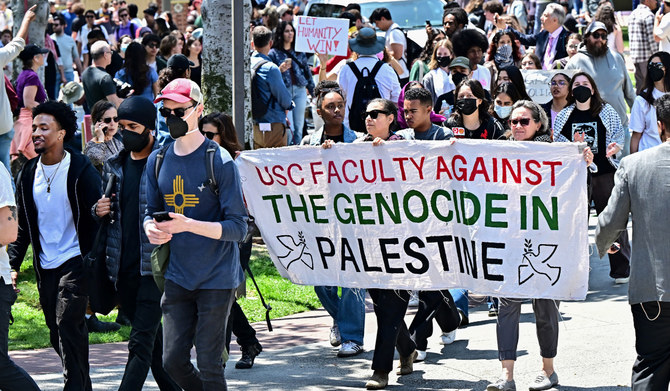
- Israel has killed more than 34,000 Palestinians, according to Gaza’s Health Ministry
WASHINGTON: Students protesting the war in Gaza abandoned their camp at the University of Southern California early Sunday after being surrounded by police and threatened with arrest, while Northeastern University’s commencement began peacefully at Boston’s Fenway Park.
Developments in both places were being watched closely following scores of arrests last month — 94 people at USC in Los Angeles and about 100 at Northeastern in Boston.
Dozens of Los Angeles Police Department officers arrived about 4 a.m. at USC to assist campus safety officers. The university had warned of arrests on social media and in person. Video showed some protesters packing up and leaving, while officers formed lines to push others away from the camp as it emptied out. The university said there were no reports of any arrests.
USC President Carol Folt said it was time to draw a line because “the occupation was spiraling in a dangerous direction” with areas of campus blocked and people being harassed.
“The operation was peaceful,” Folt wrote in an update. “Campus is opening, students are returning to prepare for finals, and commencement set-up is in full swing.”
USC earlier canceled its main graduation ceremony while allowing other commencement activities to continue.
At the Northeastern commencement Sunday, some students waved small Palestinian and Israeli flags, but were outnumbered by those waving the flags of India and the US, among others. Undergraduate student speaker Rebecca Bamidele drew brief cheers when she called for peace in Gaza.
The Associated Press has tallied about 2,500 people arrested at about 50 campuses since April 18, based on its reporting and statements from universities and law enforcement.
Arrests continued apace over the weekend. At the University of Virginia, there were 25 arrests Saturday for trespassing after police clashed with protesters who refused to remove tents. At the Art Institute of Chicago campus, police cleared a pro-Palestinian encampment hours after it was set up Saturday and arrested 68 people, saying they would be charged with criminal trespass.
ARRESTS IN VIRGINIA
In Charlottesville, Virginia, student demonstrators began their protest on a lawn outside the school chapel Tuesday. Video on Saturday showed police in riot gear and holding shields lined up on campus, while protesters chanted “Free Palestine.”
As police moved in, students were pushed to the ground, pulled by their arms and sprayed with a chemical irritant, Laura Goldblatt, an assistant professor who has been helping the demonstrators, told The Washington Post. The university said protesters were told that tents were banned under school policy and were asked to remove them.
Virginia Attorney General Jason Miyares told Fox News on Sunday the police response was justified because students had been warned repeatedly to leave, were violating the school’s conduct code, and that outsiders who were not students provided protesters with supplies like wooden barriers.
“We’ve seen folks that are not students show up in riot gear with bull horns to direct the protesters on how to flank our officers,” Miyares said.
He said some had put bear spray into water bottles and thrown them at officers.
It was the latest clash in weeks of protests and tension at US colleges and universities.
Tent encampments of protesters urging universities to stop doing business with Israel or companies they say support the war in Gaza have spread in a student movement unlike any other this century. Some schools reached agreements with protesters to end the demonstrations and reduce the possibility of disrupting final exams and commencements.
DEMONSTRATIONS AMID COMMENCEMENT
The University of Michigan was among the schools bracing for protests during commencement this weekend, as were Indiana University, Ohio State University and Northeastern. More ceremonies are planned in the coming weeks.
In Ann Arbor, there was a protest at the beginning of the event at Michigan Stadium. About 75 people, many wearing traditional Arabic kaffiyehs along with their graduation caps, marched up the main aisle toward the stage.
They chanted “Regents, regents, you can’t hide! You are funding genocide!” while holding signs, including one that read: “No universities left in Gaza.”
Overhead, planes pulled banners with competing messages. “Divest from Israel now! Free Palestine!” and “We stand with Israel. Jewish lives matter.”
Officials said no one was arrested, and the protest didn’t seriously interrupt the nearly two-hour event, attended by tens of thousands of people, some of them waving Israeli flags.
OTHER PROTESTS CONTINUE
At Indiana University, protesters urged supporters to wear their kaffiyehs and walk out during remarks by school President Pamela Whitten on Saturday evening. The Bloomington campus designated a protest zone outside Memorial Stadium, where the ceremony was held.
At Princeton University in New Jersey, 18 students began a hunger strike to try to push the university to divest from companies tied to Israel. Students at other colleges, including Brown and Yale, launched similar hunger strikes this year before the more recent wave of demonstrations.
The protests stem from the conflict that started Oct. 7 when Hamas militants attacked southern Israel, killing about 1,200 people, mostly civilians, and taking roughly 250 hostages. Vowing to destroy Hamas, Israel launched an offensive in Gaza that has killed more than 34,500 Palestinians, about two-thirds of them women and children, according to the Health Ministry in the Hamas-ruled territory. Israeli strikes have devastated the enclave and displaced most of its inhabitants.
China’s Xi in France for Macron talks on Ukraine
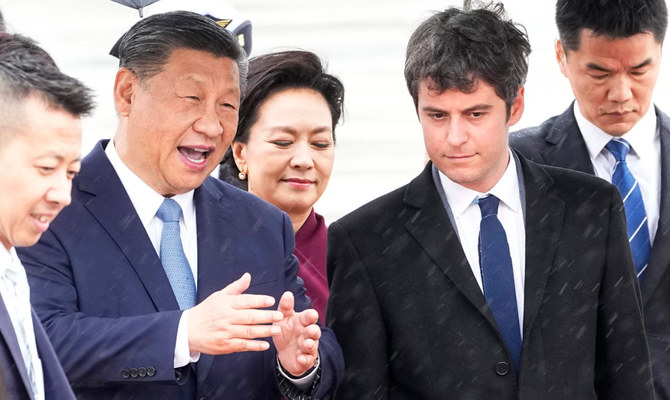
- Tuesday will see Macron take Xi to the Pyrenees mountains to an area he used to visit as a boy for a day of less public talks
PARIS: Chinese President Xi Jinping arrived in France Sunday on a state visit hosted by Emmanuel Macron where the French leader will seek to warn his counterpart against backing Russia in the conflict over Ukraine.
Xi’s arrival for the visit marking 60 years of diplomatic relations between France and China heralded the start of his first trip to Europe since 2019, which will also see him visit Serbia and Hungary.
But Xi’s choice of France as the sole major European power to visit indicates the relative warmth in Sino-French relations since Macron made his own state visit to China in April 2023 and acknowledges the French leader’s stature as an EU powerbroker.
The leader of the one-party Communist state of more than 1.4 billion people, accompanied by his wife Peng Liyuan, was welcomed under umbrellas at a drizzly Paris Orly airport by Prime Minister Gabriel Attal.
Xi is to hold a day of talks in Paris on Monday — also including EU Commission chief Ursula von der Leyen — followed by a state banquet hosted by Macron at the Elysee.
Tuesday will see Macron take Xi to the Pyrenees mountains to an area he used to visit as a boy for a day of less public talks.
In an op-ed for Le Figaro daily, Xi said that he wanted to work with the international community to find ways to solve the conflict sparked by Russia’s invasion of Ukraine, while emphasising that China was “neither a party nor a participant” in the conflict.
“We hope that peace and stability will return quickly to Europe and intend to work with France and the entire international community to find good paths to resolve the crisis,” he wrote.
A key priority of Macron will be to warn Xi of the danger of backing Russia, with Western officials concerned Moscow is already using Chinese machine tools in arms production.
Beijing’s ties with Moscow have, if anything, warmed after the invasion and the West wants China above all not to supply weapons to Russia and risk tipping the balance in the conflict.
“It is in our interest to get China to weigh in on the stability of the international order,” said Macron in an interview with The Economist published on Thursday.
Macron also said in the interview that Europe must defend its “strategic interests” in its economic relations with China, accusing Beijing of not respecting the rules on international trade.
But he acknowledged in an interview with the La Tribune Dimanche newspaper that Europeans are “not unanimous” on the strategy to adopt as “certain actors still see China essentially as a market of opportunities” while it “exports massively” to Europe.
The French president had gladdened Chinese state media and troubled some EU allies after his 2023 visit by declaring that Europe should not be drawn into a “bloc versus bloc” standoff between China and the United States, particularly over democratic, self-ruled Taiwan.
China views the island as part of its territory and has vowed to take it one day, by force if necessary.
Rights groups are urging Macron to bring up human rights in the talks, accusing China of failing to respect the rights of the Uyghur Muslim minority and of keeping dozens of journalists behind bars.
“President Macron should make it clear to Xi Jinping that Beijing’s crimes against humanity come with consequences for China’s relations with France,” said Maya Wang, acting China director at Human Rights Watch.
The group said human rights in China had “severely deteriorated” under Xi’s rule.
A crowd of protesters on Sunday unfurled a Tibetan flag at a demonstration in Paris, accusing Xi of being a “dictator” and wanting to erase local culture in the Tibet region, an AFP reporter said. Paris police put the number of protesters at two thousand.
However analysts are skeptical that Macron will be able to exercise much sway over the Chinese leader, even with the lavish red carpet welcome and a trip to the bracing mountain airs of the Col du Tourmalet over 2,000 meters (6,560 feet) above sea level on Tuesday.
The other two countries chosen by Xi for his tour, Serbia and Hungary, are seen as among the most sympathetic to Moscow in Europe.
“The two core messages from Macron will be on Chinese support to Russia’s military capabilities and Chinese market-distorting practices,” said Janka Oertel, director of the Asia program at the European Council on Foreign Relations.
“However, both messages are unlikely to have a significant impact on Chinese behavior: Xi is not on a mission to repair ties, because from his point of view all is well.”



